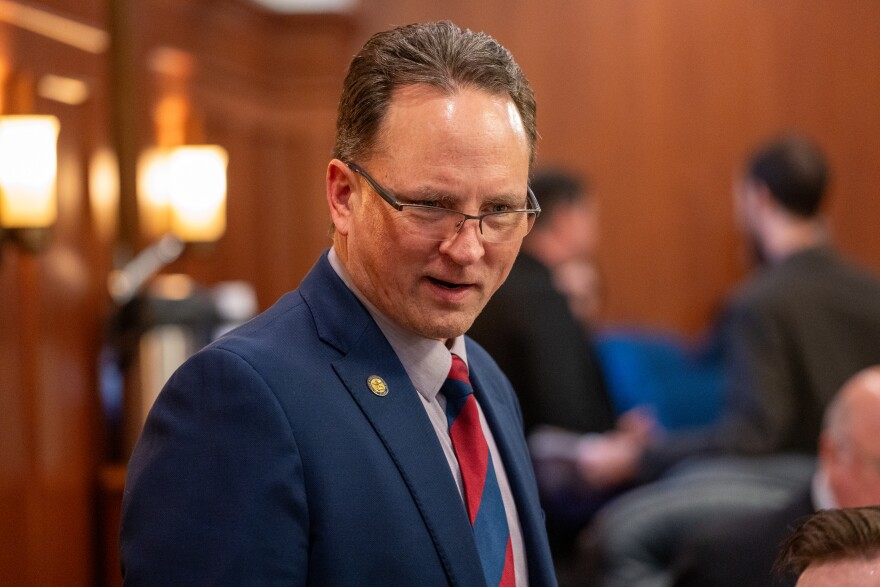Alaska Senators and Representatives gathered in a joint session Monday but failed to override the governor’s veto of a popular bipartisan education funding bill by just one vote. For the Kenai Peninsula Borough School District, which is facing a $16 million budget deficit, the school board will now consider dipping into savings and making cuts, while waiting on another possible legislative boost.
The bill, SB 140, would have increased the per-student funding by $680, the first substantial increase since 2017. It passed the House and Senate overwhelmingly last month, but Gov. Mike Dunleavy told lawmakers he would veto the bill if it didn’t include more of his priorities, including a process that would allow charter schools to bypass local school board approval.
Gov. Dunleavy issued the veto late Thursday night, shortly before the deadline. Monday afternoon, the two bodies debated for about two hours.
Sen. Jesse Bjorkman, a Nikiski Republican whose district covers much of the Kenai Peninsula, voiced his support for an override.
“Right now, the status quo puts us behind in funding, because unlike so many people have said, we haven’t done the same thing with education funding over and over again and expected different results,” Bjorkman said. “We’ve done remarkably less, Mr. President, as inflation eats away at every dollar, as inflation means that our district on the Kenai Peninsula can buy less educational opportunities, our schools can buy less.”
The Kenai Peninsula Borough School District is looking at a $16 million deficit for the next fiscal year, and will need to either secure a major state funding boost or make deep cuts to staff and programs.
Superintendent Clayton Holland said the district’s Board of Education wanted to build a budget with a potential $680 increase in mind, because members were optimistic after SB 140 passed. Now, it has to scrap that strategy and look at cuts.
“At this point, we don’t know what it is, and we have a budget due to the borough by May 1,” Holland said. “And so we have to go ahead and approach it with “we don’t know.” We can’t add one time funding we don’t know about, or a BSA increase we don’t know.”
He said the timing of the legislative process compared to the district’s hiring timeline is one of the most frustrating parts of budgeting.
“We can’t wait for a budget in May and June,” Holland said. “We have to go through this process of cuts in order to have a balanced budget by May 1, and in the meantime we’re not able to hire people, we’re not able to move forward with the vacant positions that we have.”

Republican Reps. Sarah Vance of Homer and Ben Carpenter of Nikiski voted against the override. During debate on the floor Monday, Carpenter said he was looking for greater attention to charter schools in any school legislation, which he said is what parents want.
“We’ve got waiting lists of parents who wanna get into charter schools, and districts who are not bending over backwards to make new charter schools. Why should they? They’re not financially incentivized to actually create a charter school,” he said. “It’s a burden on them, but it’s what parents want. I just point to the waiting list of parents trying to get into charter schools to prove that’s what they want.”
Holland said that’s not necessarily true in the Kenai school district, which is home to four charter schools. He said while one does have a waitlist, two are roughly on target for enrollment, and one charter is 40 students below projection.
And he said waitlists aren’t exclusive to charters; neighborhood schools with desirable locations or programs will also draw lists.
Soldotna Republican Rep. Justin Ruffridge voted for the override, and said a charter school coordinator and other provisions included in SB 140 were a positive for charters.

"I believe this bill protects and helps expand our charter school program, which is a highly successful program in our state, as we’ve heard at length,” Ruffridge said.
Holland said the school board will first look to its fund balance, or savings account, then at cuts to things like the peer-to-teacher ratio. Reducing that number by five would mean cuts to about 65 teachers, he said.
And Holland said any time the district talks about cuts, it elicits strong emotions from the public. But if the legislature does eventually provide some form of additional funding, like it did last year, he said that creates a false impression of fear mongering by the district.
“The kicker, and it always is the kicker in these things, we get late in the game, “Hey look, we’ve got this money, we don’t have to do all this.” And then there’s this piece of “You always do this,” he said. “That is just as routine as can be, and until we get sustainable, predictable funding that we can count on, this is part of the process.”
The Board of Education’s Finance Committee will meet next Monday, March 25, to revisit the budget with the veto in mind.





